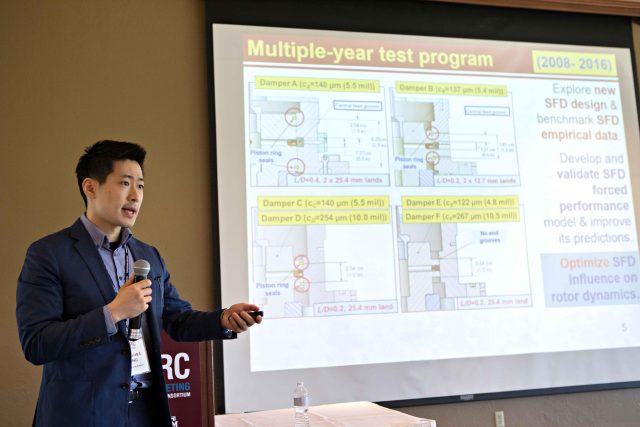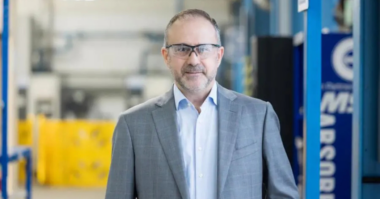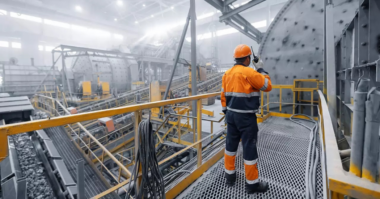Representatives from 21 industrial firms will visit Aggieland next week during the Turbomachinery Research Consortium (TRC) annual meeting. Firms will select the next round of student-led research projects, the results of which will not only impact these companies, but the turbomachinery industry at-large.
The 37th annual TRC meeting will kick off at Pebble Creek Country Club, 4500 Pebble Creek Parkway in College Station at 9 a.m. on May 31, and continue through June 2. Representatives from each TRC company will come together to listen to student and faculty researchers in the Turbomachinery Laboratory at Texas A&M University present proposals for research projects. Representatives evaluate each proposal, electing to fund 20-25 of the top-ranking projects. Turbo Lab faculty and students whose projects are selected will begin their research in September.
The TRC is a members-only group of companies who have united with the Turbo Lab, a center of the Texas A&M Engineering Experiment Station, to find answers to important questions about turbomachinery performance and reliability through research. TRC member companies provide annual grants of $25,000 to support a broad range of member-selected projects. TRC member companies have exclusive access to a continuing series of reports and computer programs on all TRC research activities dating back to the foundation of TRC in 1981. Member companies also have access to XLTRC2, a suite of high-speed, experimentally verified and user-friendly codes for executing rotordynamic analysis of rotating machinery, including pumps, compressors and turbines.
 At any given time, 15 to 20 graduate students in Texas A&M’s Department of Mechanical Engineering are supported by the TRC. Students conduct research on TRC projects at the Turbomachinery Laboratory research facility, located on George Bush Drive in College Station, adjacent to Texas A&M’s main campus. The 37,000 square foot high-bay facility is equipped with 12 top-of-the-line vibration damped test cells and variety of compressors that provide air for test rigs with capacities ranging from 4000 standard cubic feet per minute (scfm) at 120 pounds per square inch gauge (psig) to 1350 scfm at 300 psig.
At any given time, 15 to 20 graduate students in Texas A&M’s Department of Mechanical Engineering are supported by the TRC. Students conduct research on TRC projects at the Turbomachinery Laboratory research facility, located on George Bush Drive in College Station, adjacent to Texas A&M’s main campus. The 37,000 square foot high-bay facility is equipped with 12 top-of-the-line vibration damped test cells and variety of compressors that provide air for test rigs with capacities ranging from 4000 standard cubic feet per minute (scfm) at 120 pounds per square inch gauge (psig) to 1350 scfm at 300 psig.
Jennifer Gaines, a mechanical design engineer for Sulzer Turbo Services in Houston, conducted research on a two-part project for the TRC before earning her master’s degree in mechanical engineering from Texas A&M in 2014. Gaines has the pleasure of returning to the annual TRC meetings, this time as Sulzer’s point-of-contact.
“Presenting at the TRC meeting as a student was pretty overwhelming, considering the amount of knowledge and experience in the room,” Gaines said. “Whenever a TRC member has feedback, you know it’s approached with a wide base of knowledge and experience. It’s a humbling experience getting the advice of so many experts all in one room. So now, being on the other side, I have a greater sense of responsibility in trying to guide the presenting engineers in the way that I was guided.”
Gaines said she comes to the TRC meetings with an open mind. “The purpose of the Turbo Lab is to discover new and interesting things and provide solutions to preexisting problems. Any findings that come through the Lab are beneficial for us to know.”
TRC industrial firm members include:
- Atlas Copco Comptec
- BHEL Hyderabad
- The Chemours Company
- Chevron Texaco Corporation
- ConocoPhillips
- Dresser-Rand Business, part of Siemens Power and Gas Division
- Elliott Company
- ExxonMobile Research and Engineering
- GE Oil & Gas-Nuovo Pignone S.p.A.
- Hanwha Techwin
- Hess Corporation
- Hitachi
- Honeywell
- Hunan SUND Co., Ltd
- Ingersoll Rand – Engineered Centrifugal Compression
- John Crane
- Kawasaki Heavy Industries
- Keyyang Precision
- Kobe Steel Ltd.
- Koch Industries
- Lloyd’s Register ODS
- MAN Turbo SE
- Mitsubishi Heavy Industries
- New Way Air Bearings
- PETROBRAS
- Pratt & Whitney
- Praxair
- Safran Aircraft Engines
- Shell Global Solutions
- Shenyang Blower Works Group
- Solar Turbines Inc.
- Southwest Research Institute
- Statoil
- Sulzer
- Torishima Pumps
- Voith Turbo GmbH & Co. KG
- Waukesha Bearings




